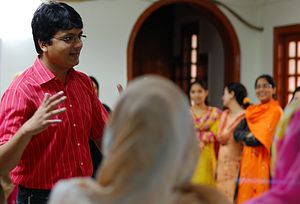Meet Shoaib Iqbal, a young Pakistani working to trigger a nationwide revolution in the arts. “The Little Art,” Iqbal’s brainchild, is a non-profit that works with public and private schools across Pakistan to equip children (irrespective of caste, creed and color) with the leadership skills, creativity, critical thinking, and confidence they need to pursue their dreams.
While The Little Art blossomed in 2009, Iqbal had already launched the Lahore International Children’s Festival (LICFF), the country’s largest children’s festival, two years earlier, in 2007. Showcasing both local and international films for Pakistani children held in the major cities of Lahore, Karachi and Islamabad, LICFF has grown exponentially over the years. Last year alone, the festival brought together 50,000 children on the LICFF platform.
“Our festival brings together children from public schools, private schools, street children and special children,” states Iqbal, “We’re not an elitist organization because art can also be an elitist idea. We’re totally not that. We keep a mix.”
Iqbal, a computer sciences graduate, has felt a strong pull towards the arts all his life. “Coming from a background of government schools [in Pakistan], I was never introduced to the arts,” he says. His defining moment came when Iqbal would visit his father’s cloth shop as a child. He’d go to the shop every day after school and soon became captivated by the colors and designs of the cloth sold at the shop. “I always carry that childhood memory with me,” Iqbal says with a laugh, “Because while everyone would be wrapped up in buying and selling, I’d be fixated on the patterns and the shades of the cloth.”
In 2006, Iqbal was awarded the Kennedy Center Fellowship at the DeVos Institute of Arts Management. He received the Endeavour Executive Award from the Australian government in 2009, becoming a Commonwealth Fellow, and, more recently, was part of the 2013 batch of Asia 21 Leaders by Asia Society.
At The Little Art, Iqbal states that he and his team focus on three major areas: working directly with children on visual arts projects, performing arts, and other projects; helping teachers make effective use of drama and film in education; and cooperating with social development organizations working with street children and special-needs children.
“For the past two or three years we’ve also been inviting children to submit their artwork to be displayed at professional art galleries around Lahore. This year 5,000 children from 200 schools across Pakistan participated…it’s growing,” Iqbal says enthusiastically.
But Iqbal’s success in launching The Little Art and LICFF didn’t happen overnight. It took a number of years of self-doubt and roadblocks before he achieved the breakthrough he needed. Years ago, Iqbal recalls, he began teaching his very own drama education course at the Ali Institute of Education in Lahore, showing teachers how to use drama to encourage students to be more engaged in the classroom. However, when the teachers would try Iqbal’s method during their classes, feedback was mixed. For one, they began facing resistance from their school administrations. “Even when the administration was okay with the method,” says Iqbal, his voice betraying a hint of incredulity, “resistance came from the children’s families who said that they were sending their children to school to study, not to have fun!”
“During my course of study abroad in the U.S. in 2006, I got a chance to reflect back on my experiences and realized that our society in Pakistan isn’t ready to accept the fact that education is all about experience and exposure,” states Iqbal. “That’s when I realized I needed to work on a social project. See, traditional education is all about individual achievement; it’s all about the grades, so when I came back I realized I needed to engage school administrations, teachers, parents and children in social experiences which are based on arts that allow kids to experience what learning is all about.”
Of the opinion that unemployment and social constraints dissuade young Pakistanis from diving headfirst into a career in the arts, Iqbal observes: “The perception in Pakistan is, whoever goes for the arts has a useless existence. As a society we don’t recognize the importance of soft venues and soft skills. Nobody cares how many art exhibitions the country will host in a year, nobody cares how many films the country is making annually. But our approach towards arts is that children should be artists – we’re promoting that art allows you to be imaginative, no matter what you do in the future you’ll end up being creative in any field you get into. A creative doctor, a creative professional, a creative banker!”
Currently working towards this year’s LICFF (which has already received more than 1,000 foreign films to be considered for the festival), Iqbal mentions that his next project is to push for content for children in mainstream Pakistan media – both print and broadcast.
“Our society is so primitive,” he says, disgruntled, adding; “We send our kids to school, ensure they’re fed and we think we’ve done our duty but we’re totally ignoring their intellectual needs. There are no libraries for children in Pakistan, no films, so our projects basically aim at addressing the intellectual needs for children in the country. We need to allow children to live the way they want to live.”
Sonya Rehman is a journalist based in Lahore, Pakistan. She can be reached at: sonjarehman [at] gmail.com


































